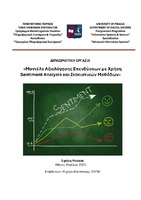Mοντέλο αξιολόγησης επενδύσεων με χρήση sentiment analysis και στατιστικών μεθόδων

View/
Keywords
Sentiment analysis ; Stock market prediction ; Twitter data ; Tesla stock ; Natural language processing ; Machine learning ; Investment evaluation ; Financial forecastingAbstract
This thesis examines the use of sentiment analysis and statistical methods for
investment evaluation. The objective is to develop a model that integrates both financial
data and sentiment data from social media to provide more accurate forecasts for
investment decision-making.
Initially, the study explores the financial environment, stock market operations, and
key risk factors affecting investments. Emphasis is placed on time series analysis and
forecasting methods, including autoregressive models (AR, MA, ARMA) and the ARIMA
model, which are widely used for stock price predictions.
Next, an analysis of Tesla's stock (TSLA) is conducted, applying various data
processing techniques such as differencing for stationarity and statistical tests like the
Dickey-Fuller Test. Several forecasting models are tested, including ARIMA and machine
learning algorithms such as Random Forest and LightGBM.
A significant part of this research focuses on sentiment analysis of Twitter users
regarding Tesla's stock. The VADER tool is used to classify tweets as positive, negative,
or neutral, and the average sentiment score is incorporated as a variable in the predictive
models.
The results indicate that combining financial data with sentiment analysis improves
TSLA stock price predictions. The best performance is achieved using machine learning
models, which yield lower prediction errors (RMSE). The study concludes that leveraging
investor sentiment alongside financial data enhances investment decision-making
accuracy.


